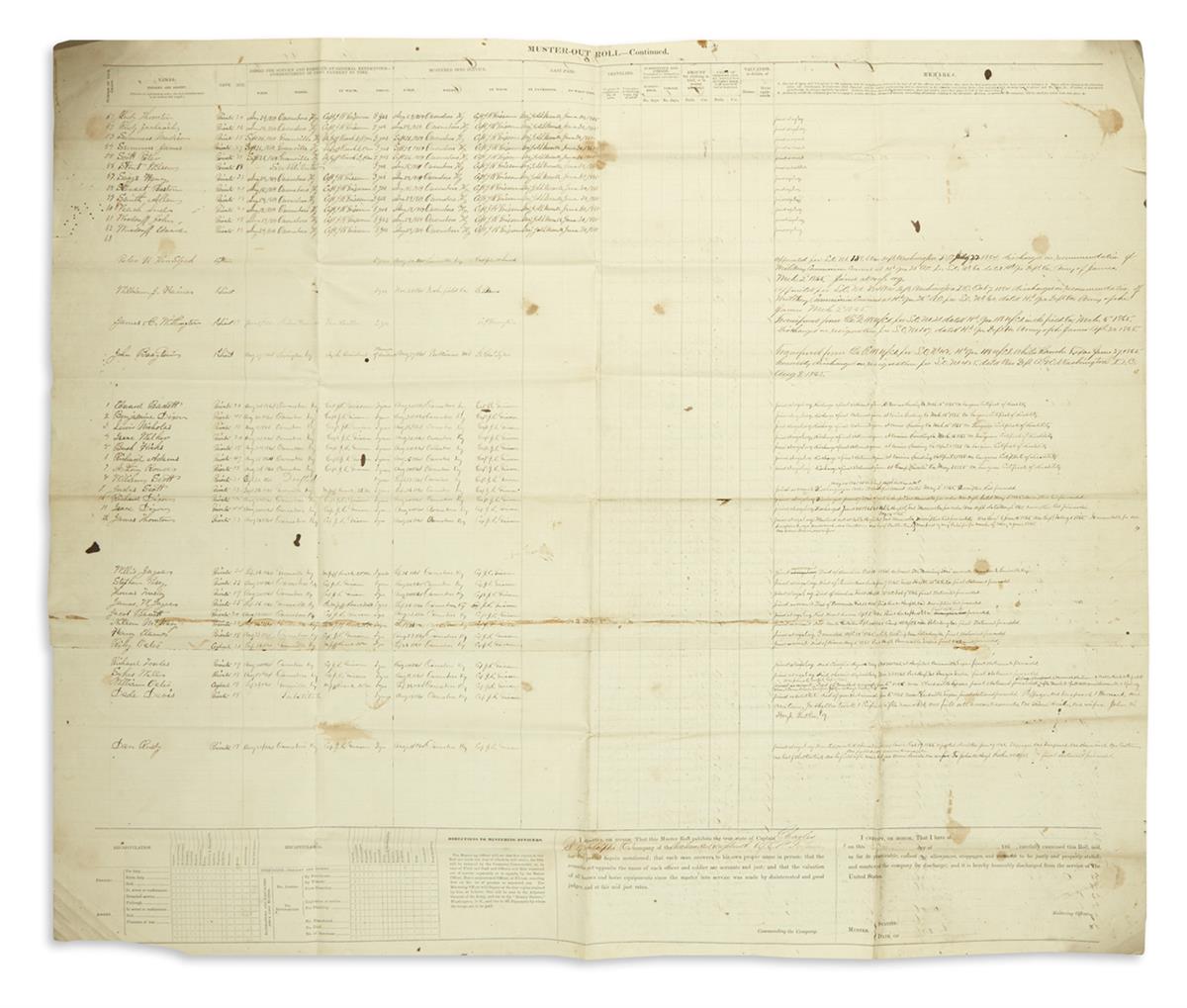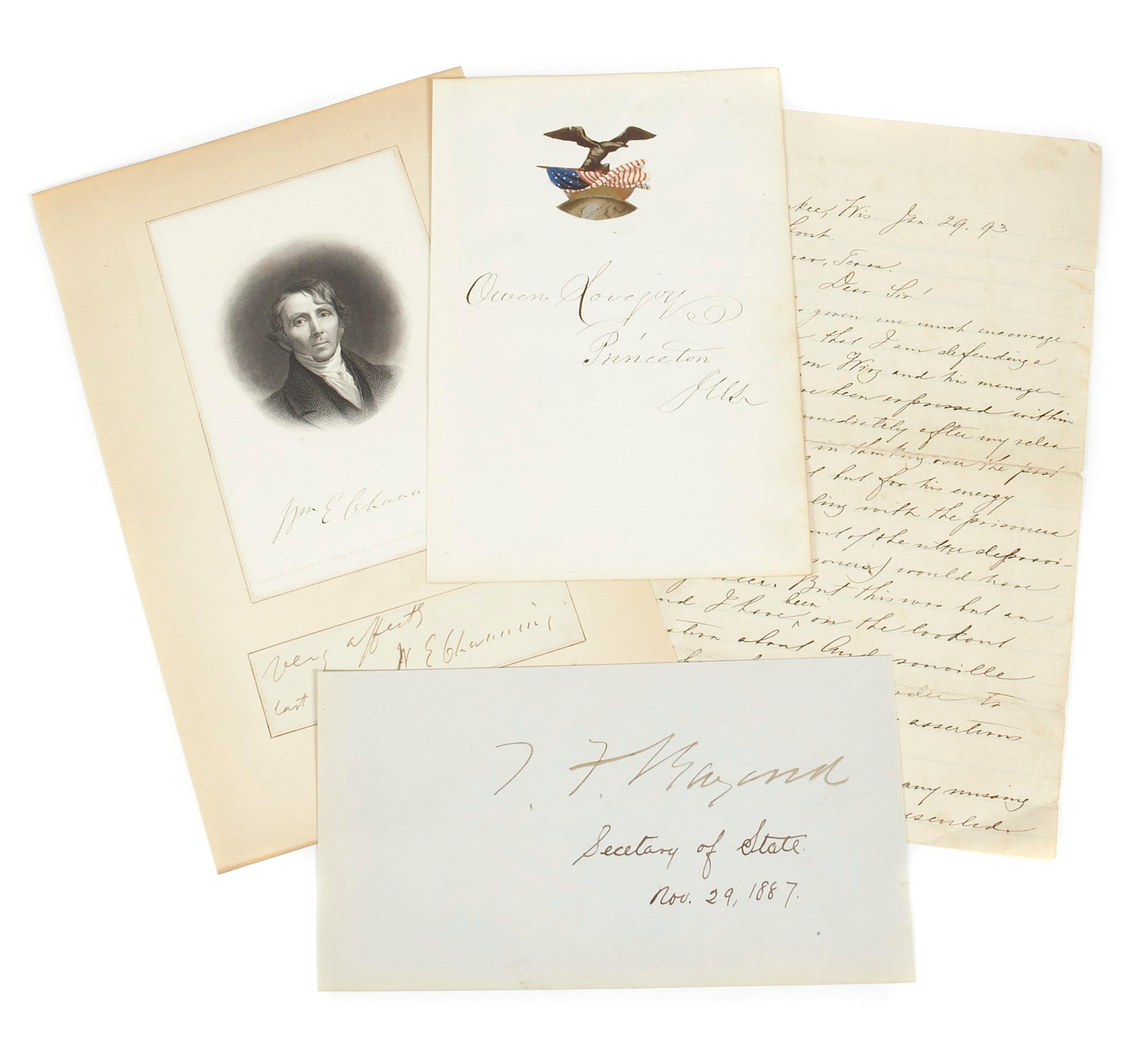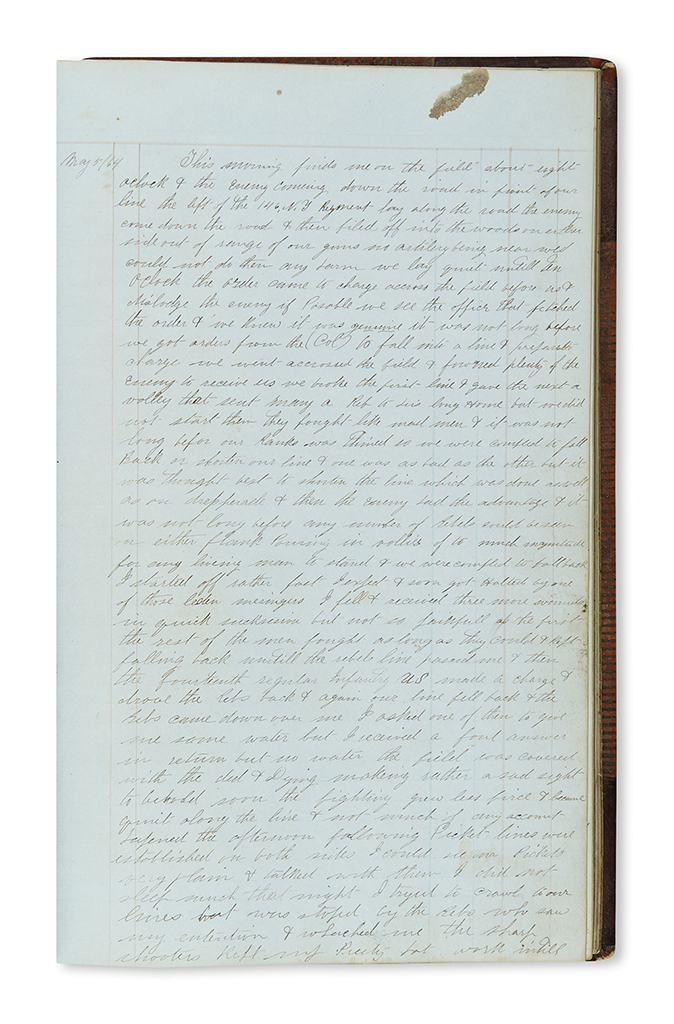Manuscript memoir of a soldier captured at the Battle of the Wilderness, and describing his imprisonment at Andersonville.
Camp Parole Hospital, Annapolis, MD: May-June 1865. 13½ pp., written within a ledger containing both antebellum and war-date receipts and accounts of a store in Loudon TN, and later used at the Camp Parole Hospital in Annapolis, folio (300 x 240 mm). Contemporary suede, covers tooled, cornered in calf, spine with raised bands and red morocco lettering label in gilt. Condition: some paper loss to blank pages in the rear; covers with some light staining, lower spine perished. a union private’s unpublished memoir of capture, andersonville prison, and escape. Charles E. Pierce, a private in Company I of the 146th New York infantry, begins his memoir describing the Battle of the Wilderness on 5 May 1864, and the overwhelming Confederate charge: “I started off [in retreat] rather fast I expect & soon got halted by one of those leden mesingers … I fell and received three more wounds in quick sucksesion but not so faithful as the first … the rest of the men fought as long as they could … the field was covered with the ded & dying making rather a sad sight to behold.” Falling behind enemy lines, Pierce is eventually taken to an outdoor hospital. After several weeks of recovering, with detailed descriptions of his wounds, Pierce is transfered between different prisons and hospitals, including by train to Danville and Columbia: “arrived there after two days & one nights ride in a box car sixty in each car so it was imposable to lay down. The doors were kept shut during the night so we would almost suffocate.” After passing through Macon, Pierce arrived by train at Andersonville: “here we found the most filthy & sick looking men I ever saw. I never will forget the thoughts I had on entering that Prison. I made up my mind that I had done all the soldiering I would do in this world.” Moving between stockades, Pierce describes guards killing five men and deaths of other men “buried alive in the mud.” Pierce describes two months of rain that made outdoor living impossible and the dearth of food: “then we got some beans & Bacon once in a while for a change but there was two bugs to one bean & five magots to one ration of Bacon that was as large as angle worms in the northern states, but our grub was good not withstanding all the cralling animals that infested our Habitiation in this southern Hell …” Pierce tells of suicides in the prison, that men “would walk across the dead line [on] purpose to get shot by the guard … it was shure death … for if one of the guards shot a Yankee he got a fulong for thirty days, this was the ransom offered by the Rebs for a head & body of a Yankee & the most of them would not let a chance slip if they could help it.” In the end of September 1864, after five months, Pierce is taken to Charleston from Andersonville, writing that “there was a great rush to get out, sick, crazy & cripple all started when they hered the news.” Pierce is then transfered to an unfenced camp with young guards and makes a daring escape with a group of other men which included a makeshift raft and the help of a local black man. The escape ends with the betrayal of a local farmer. He “said we had not better come to his House when we were trying to get away for he would get us caught every time. He said he was no fool. I told him he was a good man & to stick to the confederacy & he would go to hell for it in time.” Returned to the camp, Pierce is eventually paroled and his memoir ends before he leaves the South. How Pierce’s account appears within this ledger is explained by other signatures and inscriptions within the bound volume and a letter by Pierce to his mother laid in. The ledger was “confiscated” by Charles P. Holahan, a Sergeant in the 19th Pennsylvania Cavalry, who has signed the front free endpaper, when Sherman’s army occupied Loudon TN in December 1863. Holahan in turn gifted the ledger to W. L. Cooper, the Chief Ward Master of the Camp Parole Hospital (penning a vehemently pro-Union inscription to Cooper under a 4 May 1863 en
Manuscript memoir of a soldier captured at the Battle of the Wilderness, and describing his imprisonment at Andersonville.
Camp Parole Hospital, Annapolis, MD: May-June 1865. 13½ pp., written within a ledger containing both antebellum and war-date receipts and accounts of a store in Loudon TN, and later used at the Camp Parole Hospital in Annapolis, folio (300 x 240 mm). Contemporary suede, covers tooled, cornered in calf, spine with raised bands and red morocco lettering label in gilt. Condition: some paper loss to blank pages in the rear; covers with some light staining, lower spine perished. a union private’s unpublished memoir of capture, andersonville prison, and escape. Charles E. Pierce, a private in Company I of the 146th New York infantry, begins his memoir describing the Battle of the Wilderness on 5 May 1864, and the overwhelming Confederate charge: “I started off [in retreat] rather fast I expect & soon got halted by one of those leden mesingers … I fell and received three more wounds in quick sucksesion but not so faithful as the first … the rest of the men fought as long as they could … the field was covered with the ded & dying making rather a sad sight to behold.” Falling behind enemy lines, Pierce is eventually taken to an outdoor hospital. After several weeks of recovering, with detailed descriptions of his wounds, Pierce is transfered between different prisons and hospitals, including by train to Danville and Columbia: “arrived there after two days & one nights ride in a box car sixty in each car so it was imposable to lay down. The doors were kept shut during the night so we would almost suffocate.” After passing through Macon, Pierce arrived by train at Andersonville: “here we found the most filthy & sick looking men I ever saw. I never will forget the thoughts I had on entering that Prison. I made up my mind that I had done all the soldiering I would do in this world.” Moving between stockades, Pierce describes guards killing five men and deaths of other men “buried alive in the mud.” Pierce describes two months of rain that made outdoor living impossible and the dearth of food: “then we got some beans & Bacon once in a while for a change but there was two bugs to one bean & five magots to one ration of Bacon that was as large as angle worms in the northern states, but our grub was good not withstanding all the cralling animals that infested our Habitiation in this southern Hell …” Pierce tells of suicides in the prison, that men “would walk across the dead line [on] purpose to get shot by the guard … it was shure death … for if one of the guards shot a Yankee he got a fulong for thirty days, this was the ransom offered by the Rebs for a head & body of a Yankee & the most of them would not let a chance slip if they could help it.” In the end of September 1864, after five months, Pierce is taken to Charleston from Andersonville, writing that “there was a great rush to get out, sick, crazy & cripple all started when they hered the news.” Pierce is then transfered to an unfenced camp with young guards and makes a daring escape with a group of other men which included a makeshift raft and the help of a local black man. The escape ends with the betrayal of a local farmer. He “said we had not better come to his House when we were trying to get away for he would get us caught every time. He said he was no fool. I told him he was a good man & to stick to the confederacy & he would go to hell for it in time.” Returned to the camp, Pierce is eventually paroled and his memoir ends before he leaves the South. How Pierce’s account appears within this ledger is explained by other signatures and inscriptions within the bound volume and a letter by Pierce to his mother laid in. The ledger was “confiscated” by Charles P. Holahan, a Sergeant in the 19th Pennsylvania Cavalry, who has signed the front free endpaper, when Sherman’s army occupied Loudon TN in December 1863. Holahan in turn gifted the ledger to W. L. Cooper, the Chief Ward Master of the Camp Parole Hospital (penning a vehemently pro-Union inscription to Cooper under a 4 May 1863 en














Try LotSearch and its premium features for 7 days - without any costs!
Be notified automatically about new items in upcoming auctions.
Create an alert